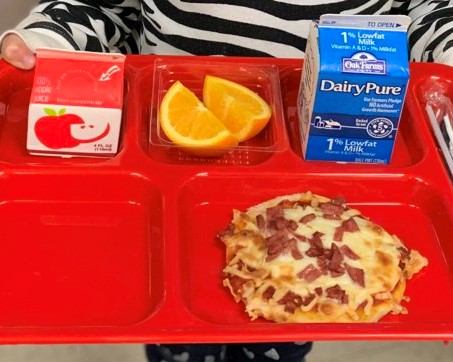
Celebrating National School Breakfast Week
8 Reasons Why Public Schools Provide School Breakfast
Children who eat school breakfasts are more likely to:

- Have more concentration and memory
- Achieve higher scores in reading and math
- Score better on standardized tests
- Be alert
- Maintain a healthy weight
- Request fewer nurse visits
- Attend school
- Graduate
Busy school mornings are sometimes challenging for families to get a healthy breakfast.
National School Breakfast Week celebrates the importance of nutritious school breakfasts in fueling students for success. The 2021 theme, “Score Big”, reminds parents that a healthy school breakfast increases academic success.
This week, school nutrition staff across the country create special menu items, events, and fun activities for all students learning at home or at school.
Academic success depends on access to food and food security. Hungry children have a harder time focusing on learning, managing emotions, and maintaining relationships with their peers and teachers.
Access to school breakfast also provides equity to students, which makes the school day easier to manage and the overall school experience more enjoyable.


Nutrition Requirements- Are School Breakfasts Healthy?
According to the USDA- Nutrition Standards, school nutrition directors are required to serve certain items as part of each meal. The School Breakfast Program also encourages the use of domestically produced foods. The required components for breakfast for K-12 students include the following:
Fruits: One full cup of fruit (or optional vegetables)
Grain: Two servings of whole grains (Meat or meat alternates may be used in place of a grain, as long as one grain serving is already part of the meal)
Milk: One cup of milk (either fat-free or 1% white milk or fat-free flavored milk)

School breakfasts and lunches can be altered to meet the dietary needs of students on a diabetic diet or a gluten-free diet.
Funding School Breakfasts- Who Pays for School Meals?
School breakfast expenses are not part of the school system’s education budget. USDA reimburses school districts to cover the cost of food, preparation, and service, as well as food service employee wages. The School Breakfast Program reimburses public schools for the meals served to more than 1.5 million qualifying Texas students daily. Texas state law requires that a school must participate in the School Breakfast Program if at least 10 percent of their students are eligible to receive free or reduced-price meals.

Additional Resources
Services:
San Antonio Area School Nutrition Services
Houston Area School Nutrition Services
Meals/ Ideas/ Recipes
Forkly- Keto Diet Breakfast and Lunch Ideas for Kids
A Sweet Life- Kid-Friendly Breakfasts for Low Carbohydrate Diet
Examples of School Breakfast Menus with Allergens- South San Antonio ISD























